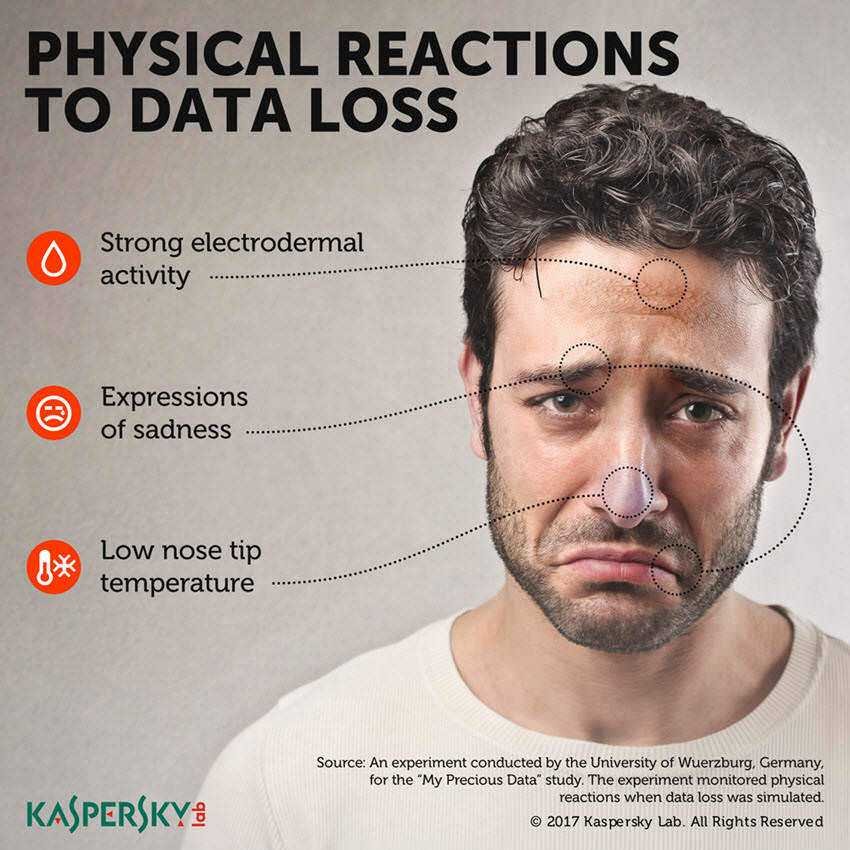The old saying "you do not know what you have until you lose it" seems more relevant than ever in the digital age, according to new research Kaspersky Lab, η οποία δείχνει ότι, ενώ οι άνθρωποι ισχυρίζονται ότι κατανοούν την αξία των data them, they don't really appreciate their importance until they lose them.
Even cold sweat can spoil people into thinking that they have lost data that they previously considered "insignificant".
These findings, which are part of the "My Precious DataKaspersky Lab, reveal how unpleasant data loss is - even when that data is not necessarily considered "important" or particularly valuable by its owner.

During the survey, people agreed that their most personally important information (“private and sensitive photos and video)) Was also the scariest type of data they could lose. However, even the loss of data that people may consider less important has also proved surprisingly traumatic.
For example, the provisual contact information loss is considered particularly concerning by many, placing it in the top three most feared types of data loss, despite the fact that contact information generally ranks much lower in terms of data "importance".
Research has thus revealed contradictions in the importance people attach to their data and the reality of the discomfort they face when they lose data that they themselves did not initially consider important.
In the context of the research, Kaspersky Lab has teamed up with psychologists from the University of Wuerzburg to measure people's physical responses to data loss through a series of three experiments. While psychologists were expecting to see much stronger reactions to the loss of important data, it was surprising that participants showed signs of discomfort even in the loss of almost insignificant data.
During the trial, psychologists measured electrodermic activity (changes in sweat glands in the skin), and while users were more likely to sweat when they thought they had lost important data, sweat levels were not so lower when they considered they had lost less important data.
The same pattern was found during the other two experiments.
For example, the temperature of the nose ends of humans decreased when the loss of important data was simulated. This physical stress indicator showed that the respondents literally "freeze from their fear".
However temperature of the tip of the nose decreased even in cases where respondents believed they had missed trivial data, and the difference was not as large as psychologists had expected. Similarly, when systematic facial expressions were measured, the experiment detected expressions of sadness when the loss of both important and unimportant data was simulated.
Although experiments have shown that the idea of data loss of cold sweat bathes people and is characterized by intense discomfort, the difference in electrodermal activity, nasal tip temperatures and grief expressions were surprisingly small when comparing the loss of significant and insignificant data. This shows that even the loss of insignificant data has negative physical manifestations, with respondents becoming aware of how important these data are for themselves when they believe they have lost them.
Dr. Astrid Carolus, Media Psychologist at the University of Wuerzburg, said:
"Our experiment shows that people - at least to this day - rarely consider their data valuable. It's one of our future challenges to help people understand what companies already know: data is valuable. Therefore, it is important to point out what the data represents and what it means to people personally. To appreciate their data, people need to understand or even feel, for example, that photos are not just images and contacts are not just addresses. These categories of data are probably the most valuable memories of people's lives and their representation in social connectivity and coexistence. The value of the data must be communicated. "Only then can people realize how valuable their data is."
Andrei Mochola, Head of Consumer Business of Kaspersky Lab, commented:
"Research reveals that the issue of data loss is causing emotional and physical reactions to humans. However, the reality seems to be that people do not really know which category of data is more valuable to themselves until they are lost, with people having intense physical responses even when they think they have lost insignificant data. Perhaps this explains why people do not give the data they store on their smartphones, tablets and computers the love and protection they deserve, despite the emotional attachment they claim to have. They still need to really understand the value of their data and take appropriate measures to protect them. "
For more information on experiment and study, please refer to report as well as to the related video.





